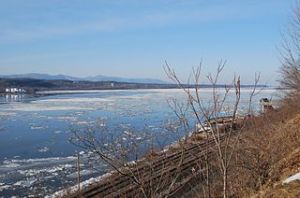David Strayer and his colleagues have tracked
25 years of data on the Hudson River.

Photo credit: Juliancolton
Transcript of the Audio Podcast:
Taking the health history of the Hudson River… on this CurrentCast.
Ecologist David Strayer and his colleagues at the Carey Institute of Ecosystem Studies have analyzed the Hudson River for decades.
Looking at more than twenty years of data, they noticed that the impacts of invasive zebra mussels have changed over time. For example, small organisms called zooplankton that initially died back have now rebounded.
Strayer: “And so we’re seeing this sort of long-term invasion dynamic, and that hasn’t been studied very much, even though a lot of ecosystems have been invaded, just because ecologists haven’t been able to track the systems for long enough.”
So Strayer says that to better manage rivers, we should monitor their health like we do our own – with regular checkups that allow us to respond as conditions change.
Support for CurrentCast comes from the Mitsubishi Corporation Foundation for the Americas. Learn more online at CurrentCast.org
Learn More:

David Strayer, photo by S. Cillo
- “Study documents Hudson River ecosystem changes over 25 years” from Environmental Monitor
- “Hudson River Ecosystem Study” from the Cary Institute of Ecosystem Studies
- A History of the Hudson River from Riverkeeper
- David Strayer’s web site




